
Premium Botswana Itinerary
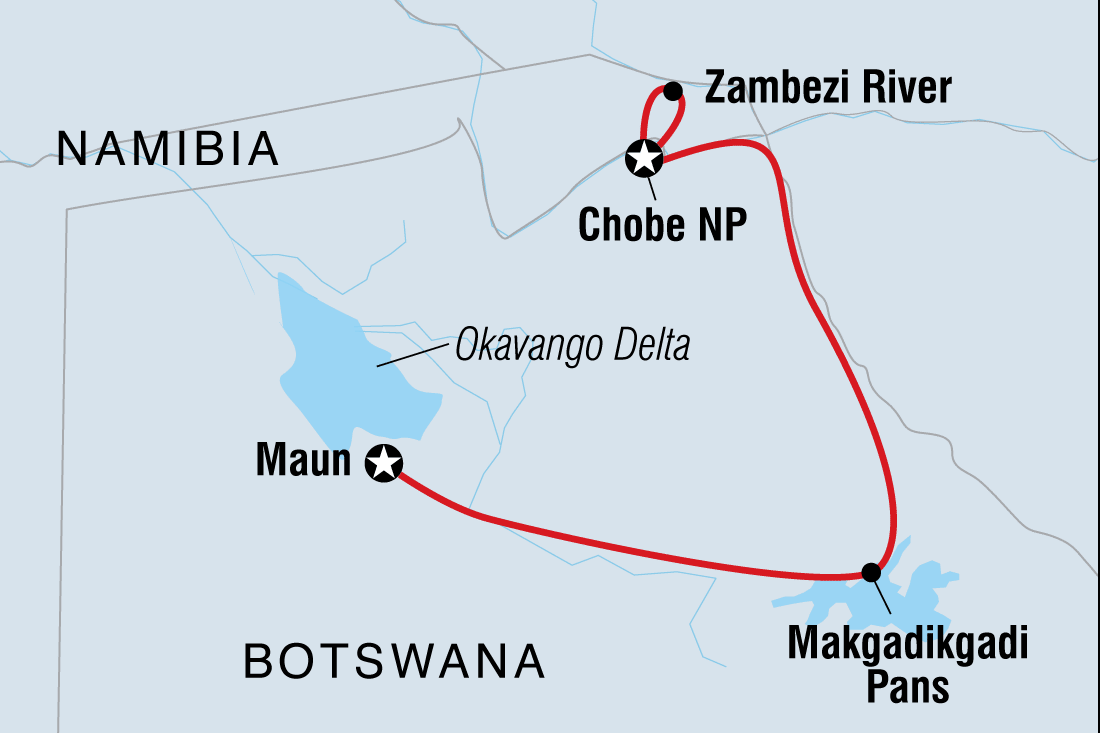


O Amogelesegile! Welcome to Botswana. Your adventure begins at Chobe National Park – one of Africa’s premier wildlife destinations and home to its largest population of elephants in the world. When you arrive at the airport, you’ll be met by a Chobe Safari Lodge representative and transferred to your accommodation on the banks of the Chobe River, at the fringe of the park. Meet your local leader and fellow travellers at a welcome meeting at 6 pm. After, head out for dinner at the lodge. Enjoy a celebration of Indigenous food and the rich flavours of Africa as you dine alongside the scenic Chobe River.
Rise early for a morning game drive in Chobe National Park. You might see elephants drinking at the water's edge, large herds of cape buffalo and many impalas within the park. Head back to the lodge for breakfast, then journey to the Ngoma Border Post before continuing to the Namibian side of the Zambezi River. Tonight you’ll stay in your Feature Stay accommodation – the fabulous Zambezi Mubala Lodge. Newly built, the Zambezi Mubala is a secret river hideaway where you can find hippos, vervet monkeys and over 450 species of birds. Arrive in time for a hearty lunch at the lodge, then enjoy some downtime to relax by the pool, spot wildlife from the bar or soak up the wild surroundings on the banks of the Zambezi River. Speak to your leader about the optional seasonal activities for the afternoon, including a canoe trip, guided walking trail or a birding drive.
Today, enjoy a restful morning at your Feature Stay. This afternoon, take a cruise down the Zambezi River. The privileged position of your camp allows you to access a part of the river that most visitors don’t get to see, which means you can view the abundant wildlife without the crowds – look out for large herds of elephants, buffalo and antelope. After, head back to the lodge for dinner and watch the sunset change the colours of the landscape.
Heading south, cross the Ngoma border back into Botswana and continue your journey to the vast salt flats and grassy plains of the Makgadikgadi Pans. Located in the north-east of Botswana, the Makgadikgadi Pans sit in the middle of a dry savanna and are all that remain of the former Lake Makgadikgadi. This afternoon, you’ll head out on a 4WD excursion. The immense, sprawling salt flat will unfold in front of you as you look out for birds and animals, some who are seasonal visitors and some who call the area home all year. Sit out on the pans and enjoy drinks and snacks as the sun sets, then return to the lodge for dinner.
Travel to the edge of the Ntwetwe Salt Pans, home to a resident family of meerkats. With the aid of trackers, you'll observe their morning rituals – watch the meerkats bask in the morning sun before heading out to forage. When you’ve had your fill of watching these magnificent creatures, you’ll stop at a lodge for lunch, then continue to Maun – the gateway to the Okavango Delta, one of the world's most complex ecosystems.
Today, you'll take a traditional mokoro (a dugout canoe steered by friendly local 'polers') for an Okavango waterways experience. With some luck, you might spot some of the delta's wildlife or exotic birdlife. Spend some time exploring the maze of lagoons, lakes and streams by mokoro before exploring on foot with a local guide. View plants, trees and animals from a different perspective and observe close-up details often missed on game drives. Your guide will provide expert knowledge and help you gain a deeper understanding of the environment. Lunch will be served on one of the many secluded islands created by the Delta waterways.
Today, your trip comes to an end after breakfast, but this doesn’t mean the adventure has to end! If you’d like to spend more time here, just get in touch with your booking agent ahead of time to organise additional accommodation. For those interested, there is the opportunity to fly over the delta in a helicopter for a bird's-eye view. This is a great way to appreciate the vast scale of this waterscape. Your leader can give you more information on this activity and how to reserve a place.

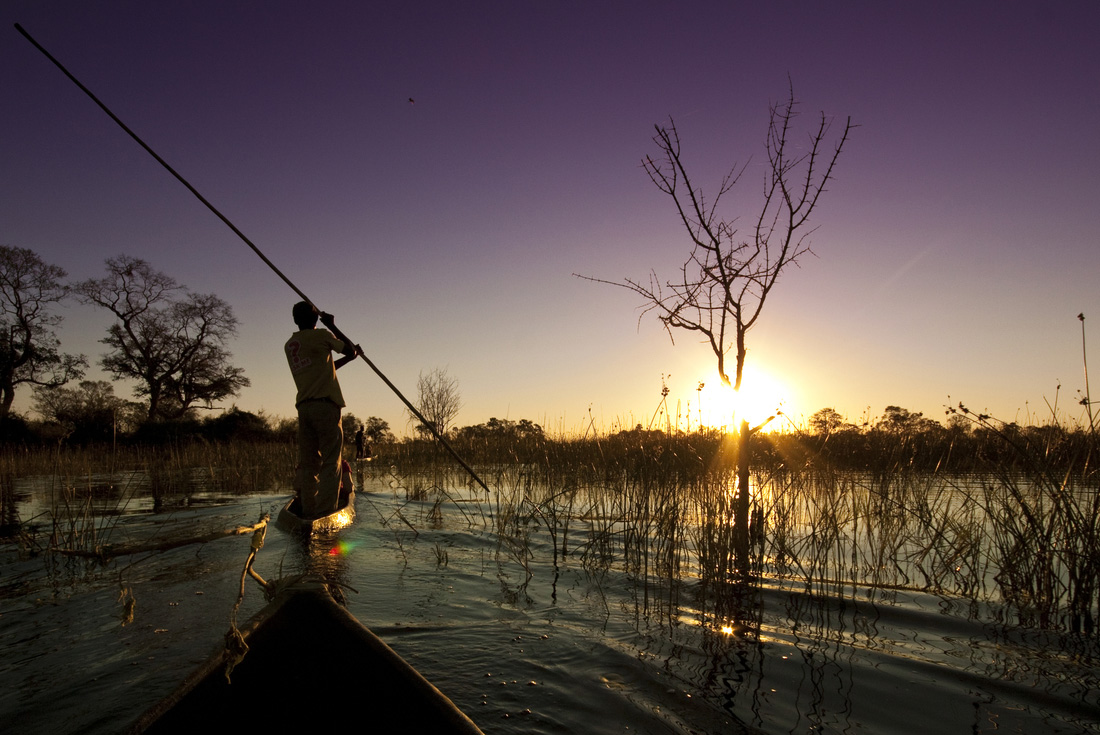
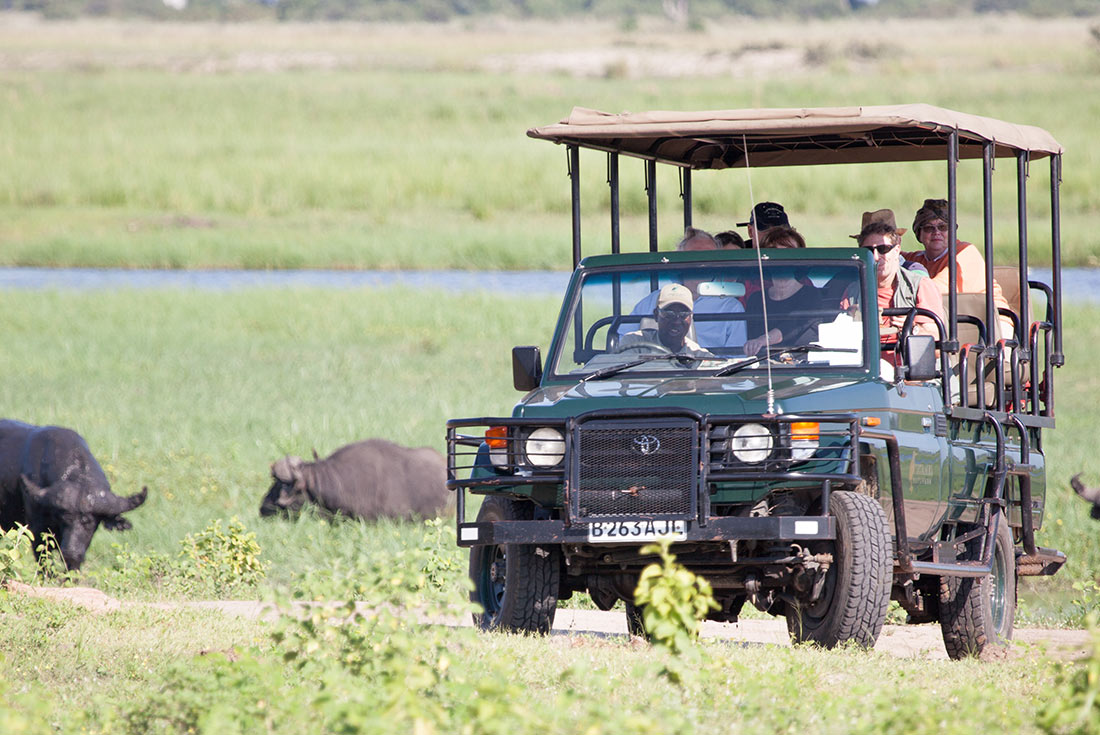
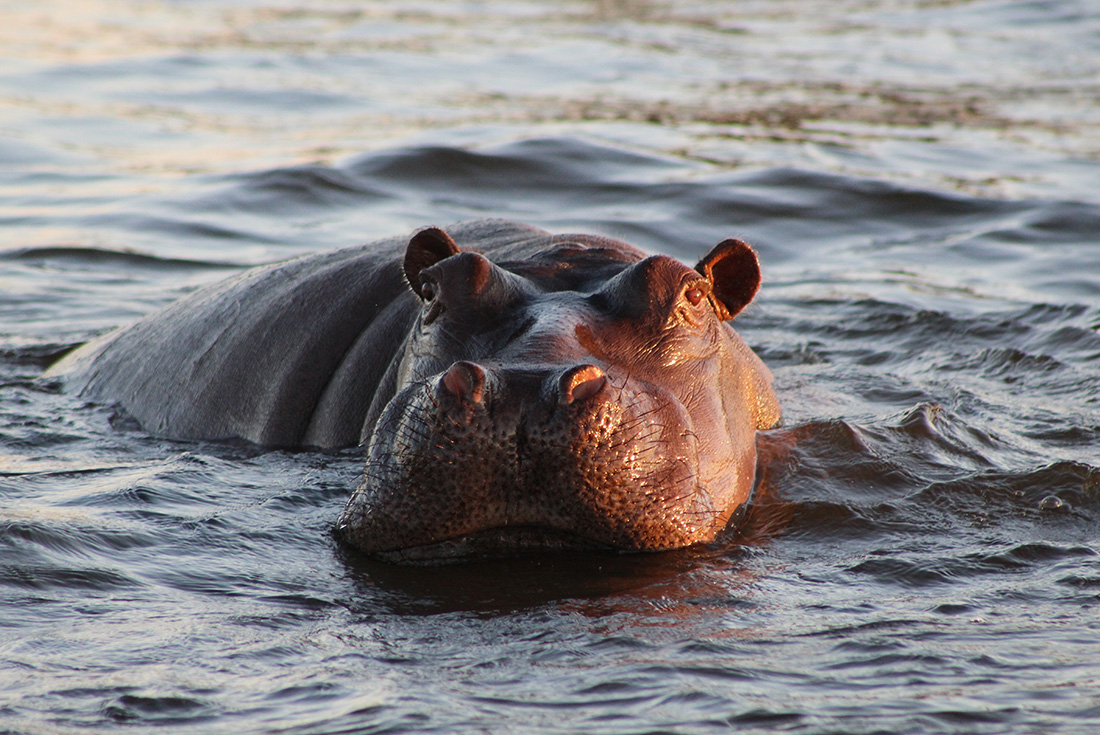
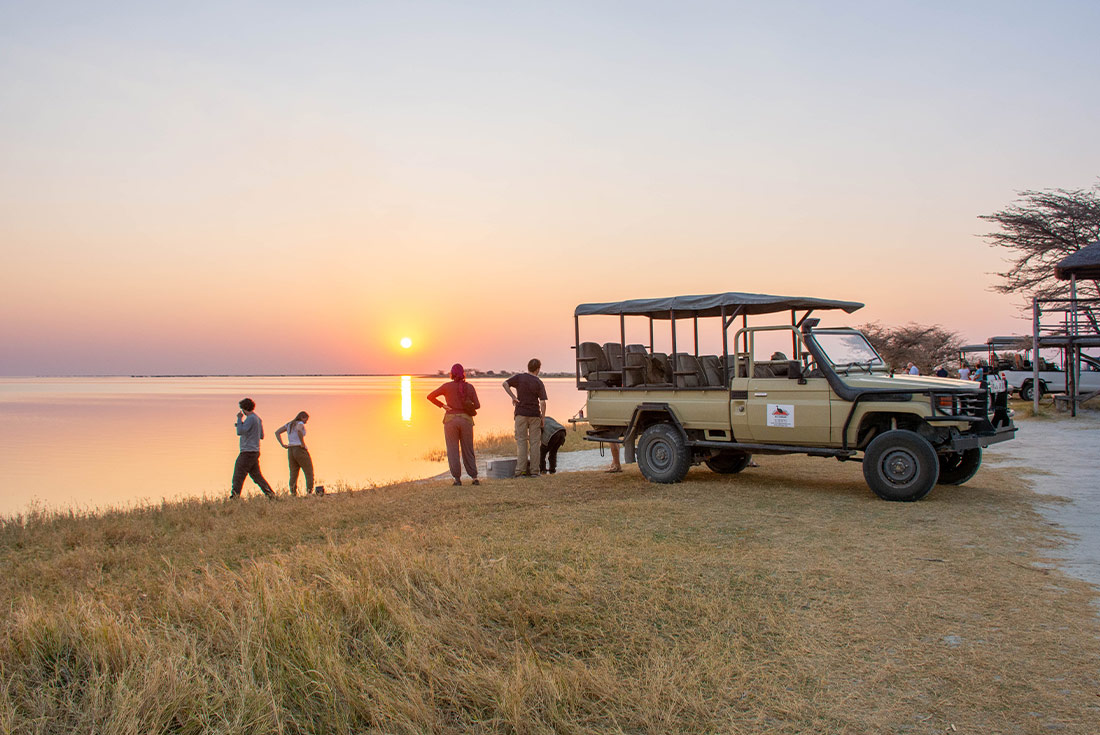
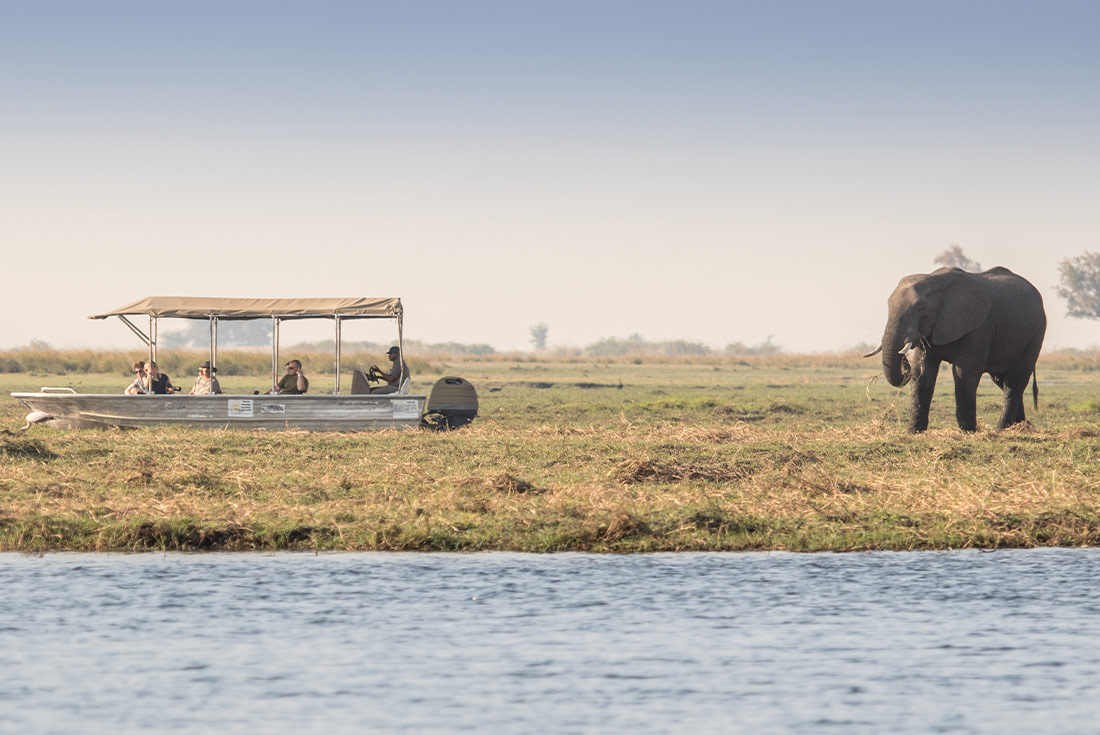
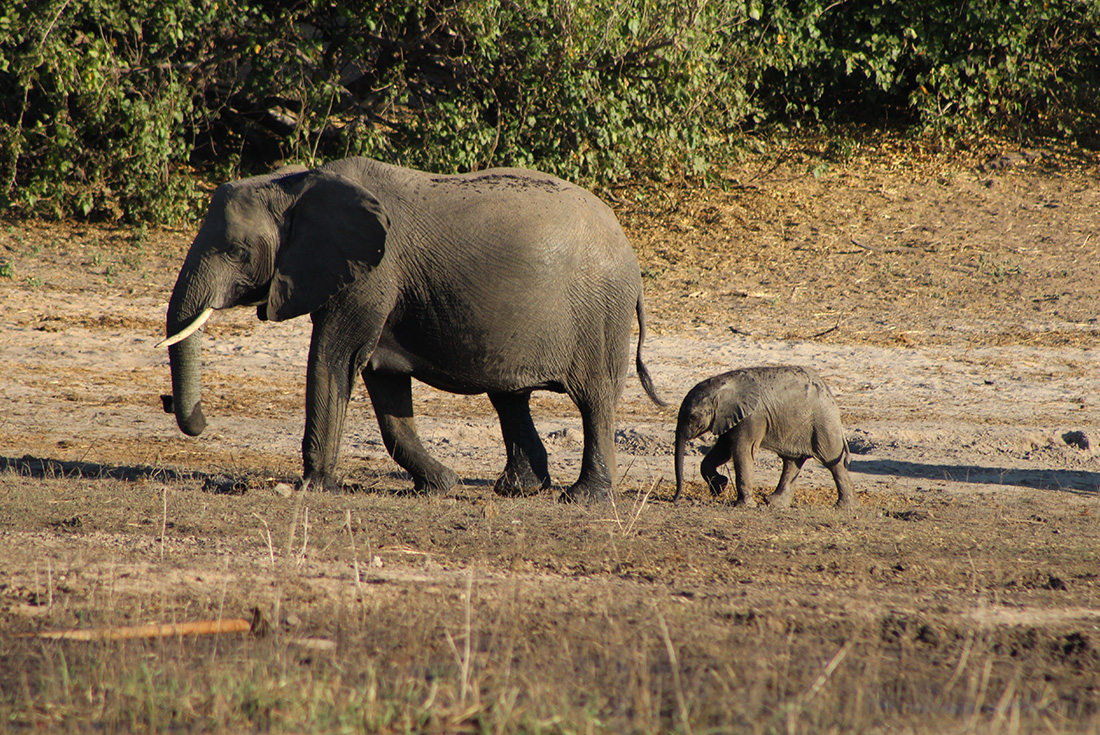
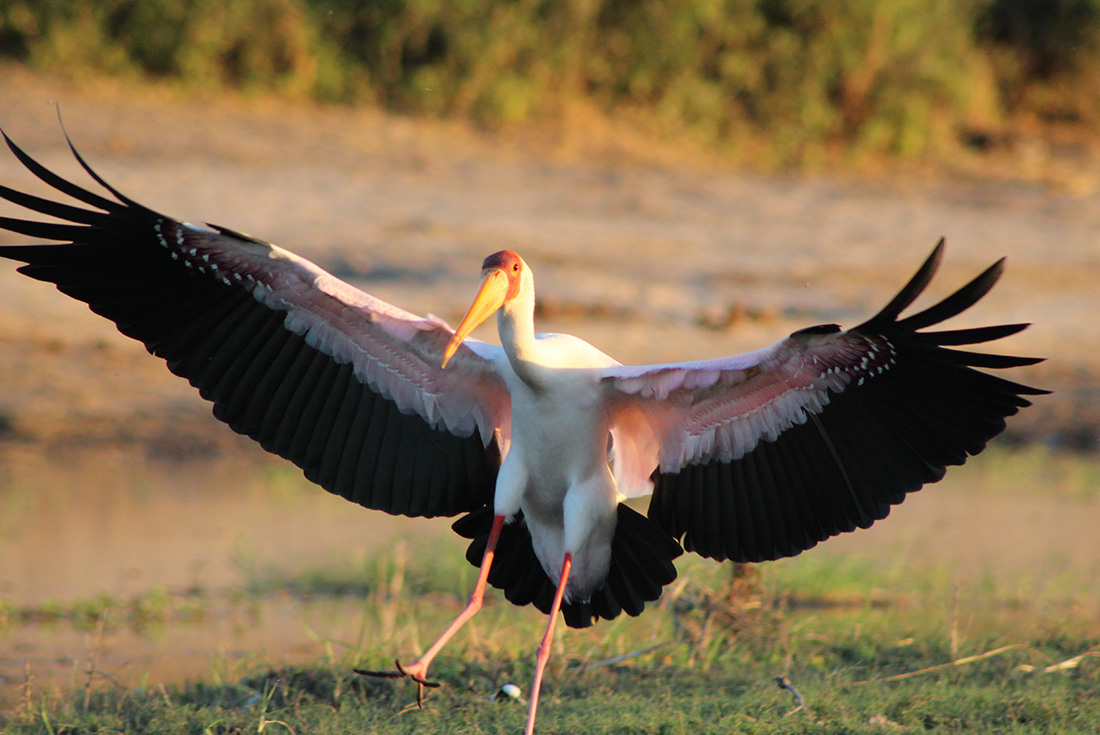
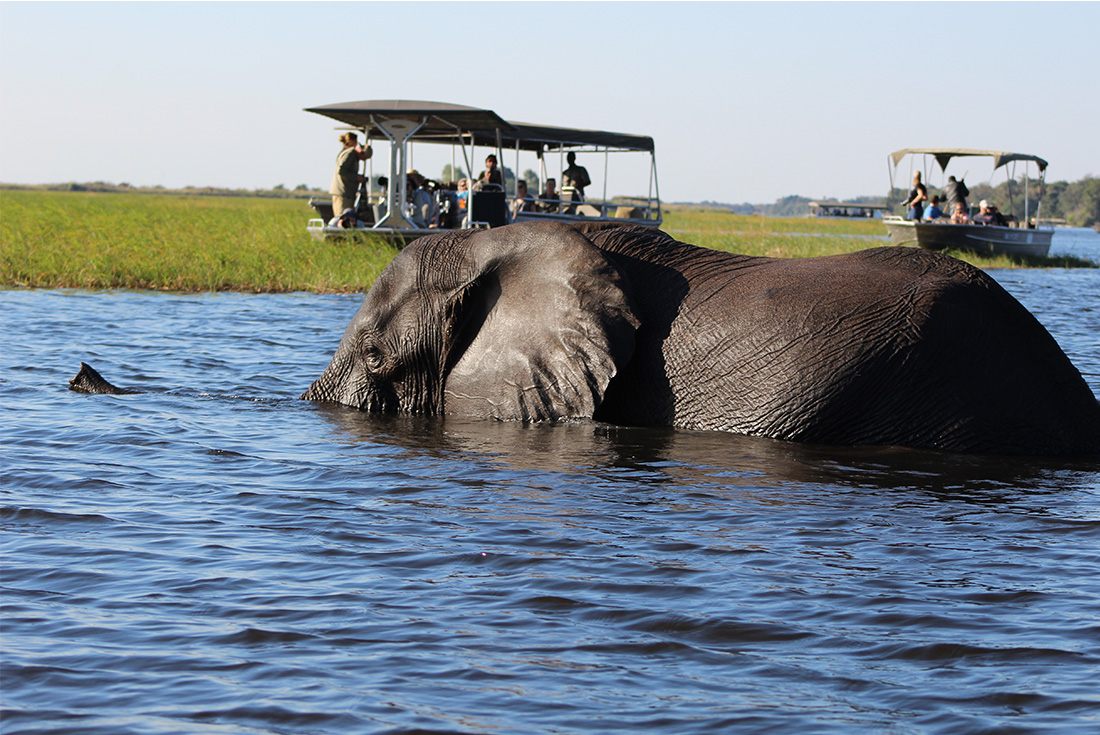
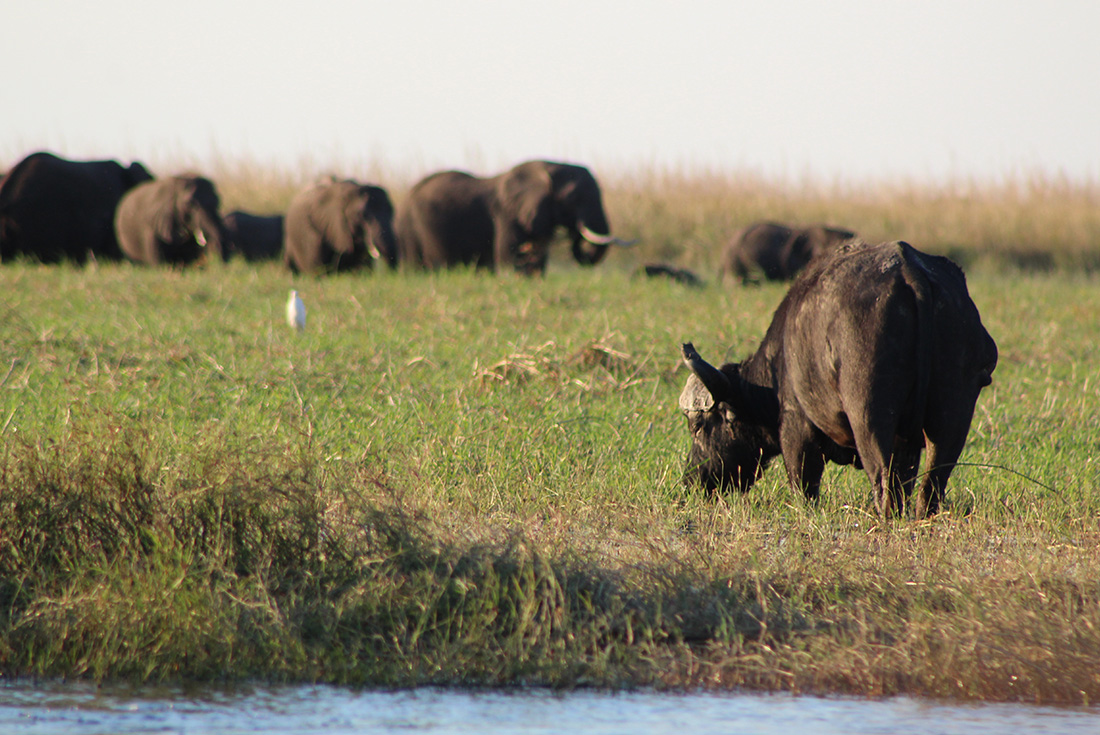
Chobe - Welcome Dinner
Complimentary Arrival Transfer
Chobe National Park - 4x4 Game Drive
Zambezi River - Afternoon River Cruise
Makgadikgadi Pans - Sunset 4x4 Excursion & Sundowner
Makgadikgadi Pans - Meerkat & Kalahari Bushman Experience
Okavango Delta - Mokoro safari
Okavango Delta - Expert Guided Bush Walk
Take a morning game drive in Chobe National Park – home to Africa’s largest concentration of elephants, this is one of the world’s great wildlife destinations.
Spend two magnificent evenings at your Feature Stay camp. Perfectly positioned on the Namibian banks of the Zambezi River, enjoy an afternoon boat cruise along the fourth largest river in Africa.
Uncover the unique beauty of the Makgadikgadi Pans during an Exclusive Experience – a 4WD excursion through the sprawling landscape, stopping for drinks and snacks as the sun goes down.
Explore the Okavango Delta's maze of lagoons, lakes and streams via a traditional mokoro boat safari. Enjoy lunch on a delta island and spot wildlife on a bush walk with an experienced guide.
Meet a family of meerkats on the edge of the Ntwetwe Salt Pans and watch them go about their morning rituals as the sun rises.
Chobe Safari Lodge, P.O. BOX 10 Kasane , Kasane, BOTSWANA
Maun Lodge, Plot No 459 , Maun, BOTSWANA, Phone: 267 6863939
1. A complimentary airport arrival transfer is included; valid if you are arriving on Day 1 or if you have booked pre-tour accommodation through us. You must provide your flight details to your booking agent at least 14 days prior to travel.
2. A complimentary airport departure transfer is included. The transfer will take you from the hotel in Maun to Maun Airport. This can be arranged through the hotel during your stay there, and please speak with your Tour Leader if you require any assistance.
3. A single supplement is available if you’d prefer not to share a room on this trip, subject to availability. Please speak to your booking agent for further information.
4. Travel is always an adventure, and our leaders are experts when it comes to dealing with anything unexpected along the journey, so pack your understanding and flexibility, sit back and relax while they take care of the rest.
5. Border crossing delays in the region have been sporadic and difficult to predict. What takes an hour one day may take four hours the next. This may affect the order of activities in the itinerary. We understand this uncertainty can be frustrating, and we strongly recommend packing a bit of patience and flexibility.
6. A visa is required for entry into Namibia. This visa can be obtained on arrival, though we encourage you to apply online in advance to speed up the border crossing process. For current information and a link to the online application, please use our Visa & Entry Requirements tool - http://www.intrepidtravel.com/visa-entry-requirements
While we always endeavour to provide the best possible holiday experience, due to the nature of travel and the areas we visit sometimes things can and do go wrong. Should any issue occur while you are on your trip, it is imperative that you discuss this with your group leader or local representative straight away so that they can do their best to rectify the problem and save any potential negative impact on the rest of your trip.
We recognise that there may be times when your group leader or local representative may not be able to resolve a situation to your satisfaction - if this is the case, please ask the group leader or local representative to speak to their direct manager.
You may also choose to provide details in your online feedback, which we ask you to complete within 30 days of the end of your trip. Please do be aware that it is very difficult for us to provide any practical help after the trip is completed, so informing us while still travelling will give us the opportunity to resolve the issue in real-time., For general contact details please use the following page: https://www.intrepidtravel.com/contact-us, In case of a genuine crisis or emergency, you can reach our local office on the numbers below:
, Intrepid's local Operator: +27828229407
As the early bird catches the worm, the early riser sights the animals. There will be many early starts either to make use of the better safari time or to beat the morning traffic on long travel days.
Take a morning game drive in Chobe National Park – home to Africa’s largest concentration of elephants, this is one of the world’s great wildlife destinations., Spend two magnificent evenings at your Feature Stay camp. Perfectly positioned on the Namibian banks of the Zambezi River, enjoy an afternoon boat cruise along the fourth largest river in Africa., Uncover the unique beauty of the Makgadikgadi Pans during an Exclusive Experience – a 4WD excursion through the sprawling landscape, stopping for drinks and snacks as the sun goes down., Explore the Okavango Delta's maze of lagoons, lakes and streams via a traditional mokoro boat safari. Enjoy lunch on a delta island and spot wildlife on a bush walk with an experienced guide., Meet a family of meerkats on the edge of the Ntwetwe Salt Pans and watch them go about their morning rituals as the sun rises.
All group trips are accompanied by one of our group leaders. The aim of the group leader is to take the hassle out of your travels and to help you have the best trip possible. Premium leaders are Intrepid’s most experienced, with in-depth knowledge and extensive local networks to make it a trip of a lifetime.
Your leader will provide information on the places you are travelling through, offer suggestions for things to do and see, recommend great local eating venues and introduce you to our local friends. While not being guides in the traditional sense, you can expect them to have a broad general knowledge of the places visited on the trip, including historical, cultural, religious, and social aspects. At Intrepid we aim to support local guides who have specialised knowledge of the regions we visit. When not already included in your trip, your leader will be able to recommend a local guide service who can share more detailed or specialised information at specific sites should you be interested in delving deeper.
TRAVEL ADVISORIES & ALERTS
We recommend that you check your government's foreign travel advisory for the latest information about the destination before you travel. You will also need to ensure that your travel insurance covers you for all destinations and activities on your trip. We also recommend saving the phone number for emergency consular assistance for your government’s consulate in the destination/s you’ll be travelling. Links to travel advisories and any current travel alerts for our trips can be found here: https://www.intrepidtravel.com/travel-alerts
PERSONAL SAFETY
Ensure you have a secure method of carrying your passport, phone, credit cards and cash while travelling such as a money belt. Leave all other high value items, including jewellery, at home Use safety deposit boxes at hotels to store your valuables when available and ensure your luggage is lockable. Be aware of the risk of pick-pocketing and petty theft. Exercise caution when walking at night, don’t walk alone and stick to well-lit streets wherever possible. Be vigilant on public transport and look out for your fellow travellers. Take precautions such as carrying your bag in front of you and never leaving personal items unattended.
LGBTQIA+ TRAVELLERS
Intrepid welcomes all LGBTQIA+ customers on our trips, however we operate in parts of the world that are less accepting. We support LGBTQIA+ customers to travel to these destinations and are committed to ensuring they face no discrimination on any part of the trip we control. We recommend you visit Equaldex (https://www.equaldex.com/) and your government's foreign travel advice for LGBTQIA+ travellers when choosing your trip., https://www.intrepidtravel.com/safety-guidelines, FIRE PRECAUTIONS
Please be aware that local laws governing tourism facilities in this region differ from those in your home country and not all the accommodation which we use has a fire exit, fire extinguishers or smoke alarms.
BALCONIES
Some hotel balconies don't meet western standards in terms of the width of the balcony fence being narrower than 10cm.
TRAFFIC AND DRIVING ON THE OTHER SIDE OF THE ROAD
Depending on where you come from please note that drivers in this part of the world may drive on the opposite side of the road from what you are used to. Look both ways before crossing any road. Traffic can be a little more chaotic than you might be used to at home. Be aware!
SEAT BELTS
Please be aware that local laws governing transportation safety may differ from those in your home country and not all the transport which we use is able to provide seat belts.
PICK POCKETING & PERSONAL SAFETY
While travelling there is always the risk of pick-pocketing and petty theft, particularly in the more touristy cities. We recommend that you exercise caution when walking at night and encourage you to walk in groups and only on main, well-lit thoroughfares. Be particularly vigilant on public transport. Simple measures like carrying your day pack on your front, not hanging your bag over the back of your chair or on the floor and wearing a money belt will reduce any chance that your valuables should go missing.
WATER SAFETY
Please take care when taking part in any activities in the ocean, river or open water, where waves and currents can be unpredictable. It's expected that anyone taking part in water activities is able to swim and have experience in open water. All swimmers should seek local advice before entering the water.
TRAVEL ADVICE & TRAVEL INSURANCE
We recommend that you check your government's advice in relation to the areas you will be visiting for their latest travel information before departure and ensure that your travel insurance covers you for all areas your itinerary covers., BILHARZIA
Bilharzia is a parasitical disease which is usually spread by swimming in contaminated water. It can be assumed that the infection is present, to a greater or lesser extent, in almost all water sources, but most especially in shallow reedy waters in the vicinity of villages.
Although the adult parasites do not themselves cause a great deal of harm, after about 4-6 weeks they start to lay eggs, which triggers an intense but usually ineffective immune response, the symptoms of which can include fever, cough, abdominal pain, and an itchy skin complaint known as safari itch. After a while the symptoms settle down and the patient is left with a sense of feeling tired all the time.
PASSPORT
You’ll need a valid passport to travel internationally and most countries require your passport to have a minimum of 6 months validity, so remember to check the expiry date.
We need your passport information to get everything ready for your trip so it’s important that the information on your booking matches your passport exactly. Please take care to provide the correct details. We recommend carrying a copy of the photo page of your passport while travelling and leaving a copy at home with family or friends.
VISAS & ENTRY REQUIREMENTS
Many countries require a visa and obtaining the correct visa for your trip and any countries you may transit through is your responsibility. We recommend you check your visa requirements as soon as you have booked your trip. This will ensure you have time to prepare your documents and for your visa application to be processed. You can check the entry requirements for your nationality on your government's foreign travel advisories, consular websites or on our page here: www.intrepidtravel.com/visa-entry-requirements, CHILDREN TRAVELLING TO BOTSWANA
If you’re travelling to Botswana with a person under the age of 18, then you need to provide a certified copy of the child’s full unabridged birth certificate in order to enter the country. This means the one listing the child’s details and both parents’ details. The short birth certificate which only lists the child’s details won’t be accepted.
Additionally, if the child is travelling with only one parent, with neither biological parent, or is unaccompanied, then they must provide an affidavit of consent of the parent(s) that are not travelling to prove that the trip is made with both parents' consent. Please contact your nearest Botswanan Embassy if you have further questions regarding this., NAMIBIA:
If you require a letter of invitation or list of hotel confirmations for your visa application, please contact your booking agent, and we will issue one tailored to your specific tour and departure.
Information not available.
Validity: 01 Jan 2026 to 31 Dec 2026
GENERAL HEALTH
All travellers need to be in good physical health in order to participate fully on this trip. For the safety and wellbeing of yourself and others, if you are unwell prior to travelling, please stay at home and contact us to make alternative arrangements.
When selecting your trip please make sure you have read through the itinerary carefully and assess your ability to manage and enjoy our style of travel. Please note that if in the assessment of our group leader or local representative a traveller is unable to complete the itinerary without undue risk to themselves and/or the rest of the group, we reserve the right to exclude them from all or part of a trip without refund.
You should consult your doctor for up-to-date medical travel information or for any necessary vaccinations before departure. We recommend that you carry a first aid kit as well as any personal medical requirements in their original packaging as they may not easily be obtained while travelling. If you are carrying medication, ensure you check your government's foreign travel advice for any local restrictions or requirements.
, YELLOW FEVER:
A valid international certificate of vaccination against Yellow Fever is required in many countries if you are arriving from a country with risk of yellow fever (eg. Kenya). You may need to present this on arrival at the airport or border crossing. Some countries will refuse entry if you are unable to present your certificate. It's also quite common for your home country to request a Yellow Fever certificate on your arrival back home.
It is your responsibility to check with your doctor well in advance of leaving home about the Yellow Fever requirements for the countries you'll be visiting.
, MALARIA & DENGUE
Malaria and Dengue are mosquito-borne diseases commonly found in many parts of Africa. Before you travel, discuss your itinerary with a doctor and monitor your government foreign travel advice for up-to-date information on risk levels in particular areas. To reduce your risk of mosquito bites, protect yourself by using insect repellent and wearing long, loose, light-coloured clothing.
Malaria symptoms typically appear 7–30 days after infection and may include fever, chills, headache, and fatigue. Doctors can prescribe medication to help prevent Malaria, so it’s important to consult your healthcare provider before travelling.
Dengue symptoms generally emerge 4–10 days after being bitten. These may include high fever, severe headache, joint and muscle pain, nausea, and rash. As there is no specific medication for Dengue prevention, avoiding mosquito bites is key.
If you develop symptoms of Malaria or Dengue while travelling or after returning home, seek medical attention straight away.
, TYPHOID:
It’s recommended that travellers to Zimbabwe ensure their typhoid vaccinations are up to date. Cases of typhoid continue to occur in parts of the country, particularly in urban areas where sanitation and water supply can be inconsistent. For the most up-to-date information, please consult your doctor or visit the World Health Organization (WHO) website., DRINKING WATER
As a rule, we recommend you don't drink tap water, even in hotels, as it may contain much higher levels of different minerals than the water you are used to at home. For local people, this is not a problem as their bodies are used to this and can cope, but for visitors drinking the tap water can result in illness. Generally, this isn't serious, an upset stomach being the only symptom, but it's enough to spoil a day or two of your holiday. Many hotels and lodges provide safe drinking water, while bottled water is another alternative. Water consumption should be about two litres a day. Rehydration salts, motion sickness tablets, and diarrhea blockers are available from many pharmacies - please source from home and bring them with you on your travels.
While travelling with us you'll experience the vast array of wonderful food available in the world. Your group leader or local representative will be able to suggest restaurants to try during your trip. To give you the maximum flexibility in deciding where, what and with whom to eat, generally not all meals are included in the trip price. This also gives you more budgeting flexibility. As a rule, our groups tend to eat together to enable you to taste a larger variety of dishes and enjoy each other's company. If you have dietary requirements and/or food allergies, please let your booking agent know prior to departure., Your group leader will endeavour to cater for specific dietary requirements where possible, and vegetarianism and gluten intolerance will be catered for in most instances. Please notify your group leader of any dietary requirements in your group meeting at the start of the trip.
For those suffering from particular food allergies, your group leader will endeavour to disclose to their fullest knowledge the main ingredients in dishes being consumed. It is, however, your personal responsibility to ensure that you do not ingest any foods to which you are allergic.
Alcoholic or non-alcoholic beverages are not part of included meals.
, LODGE-PACKED MEALS:
There are a number of days on this itinerary where your breakfast or lunch will be a ‘packed picnic meal’ provided by our lodge or tented camp. Packed meals usually consist of a sandwich, a piece of fruit, a juice, and a snack such as potato chips/crisps, nuts, muffin, or a muesli bar. This usually happens when we have early morning game drives and want to get into the park by sunrise, are out in National Parks all day, or in some instances, en-route to our next destination when there is little or no alternatives along the way.
SPENDING MONEY
When it comes to spending money on the trip, every traveller is a little different. You know your spending habits better than we do, so please budget an appropriate amount for things like optional meals, drinks, shopping, optional activities, and laundry. Make sure you have read the itinerary and inclusions thoroughly so you know what is included in the trip price and what you may need to pay for while travelling. , CREDIT CARDS, ATMS AND EXCHANGING MONEY
ATMs are available in most major towns and cities and even some campsites. Withdrawal limits vary between countries, sometimes as low as USD 100 per day, and will differ from your withdrawal limit at home. Smaller shops and restaurants only accept cash. Foreign currency is easily changed at exchange bureaus, who generally offer the best rates. If you are bringing USD cash we strongly recommend large bills in good condition, 2013 series onwards only. Any old or damaged notes may not be accepted.
Credit cards are generally accepted in tourist shops and some restaurants across Africa. Visa and Mastercard are preferred.
If you're on a multi-country trip, your leader will be able to give you an approximate idea of how much money you may need in each country.
, BOTSWANA
The unit of currency is the pula (BWP), which is divided into 100 thebe. The pula is a strong currency and any excess currency can easily be exchanged in Johannesburg. Banks, hotels and major curio shops in Botswana accept some major international credit cards, although camps and lodges in the region will only accept payment for bar bills, laundry, etc in local or foreign currency (cash). We recommend you travel with US dollars., TIPPING
Tips are included on all Intrepid Premium trips, covering hotel staff, local guides and the people who will take care of you during your travels. This amount does not include a tip for your group leader, so you may wish to set aside some funds for this.
Tipping your group leader is highly appreciated if you feel they’ve provided outstanding services throughout your trip. The amount is entirely a personal preference; however, as a guideline, the recommended amount is 8 – 10 USD or EUR per traveller per day (in a currency relevant to your destination). Of course, you are free to tip more or less as you see fit, depending on your perception of service quality and the length and involvement of your group leader on your trip., CONTINGENCY FUNDS
We try to plan for every eventuality, but there are still some things beyond our control. We reserve the right to change an itinerary after departure due to local circumstances or a Force Majeure Event. In such emergency circumstances, the additional cost of any necessary itinerary alterations will be covered by you. Please note we are not responsible for any incidental expenses that may be incurred as a result of the change of itineraries including but not limited to visas, vaccinations or non-refundable flights. Make sure you have access to an extra US$500 for emergencies (e.g. severe weather, natural disasters, civil unrest) or other events that result in unavoidable changes to the itinerary (e.g. transport strikes or cancellations, airport closures). Sometimes these things necessitate last-minute changes to enable our trips to continue to run, and as a result, there may be some extra costs involved. The recommended amount is listed in USD for the relatability of universal travellers, however, local currency may be needed once in the country to cover these costs., COMMISSIONS
Intrepid understands that the receipt of commissions in exchange for recommending particular shops or services is ingrained in the culture of the tourism industry. For this reason, we have established a centralised fund for contributions from recommended suppliers so these can be collected and distributed back into the business. Actively managing the receipt of commissions helps us maintain the level of quality you expect on one of our trips. Travel is always an adventure so Intrepid cannot explicitly guarantee the quality of a product but we aim to provide the best value trips in the market. Please let us know via the feedback form completed after your trip if we are successfully meeting - or exceeding - this objective.
What you need to bring will vary according to the trip style you have chosen, the countries you are visiting and when you are travelling. Generally speaking, we recommend you pack as lightly as possible and make sure that you are able to carry and lift your own luggage, and walk with it for short distances.
Most travellers carry their luggage in a backpack, although an overnight bag with a shoulder strap would suffice if you travel lightly. Smaller bags or backpacks with wheels are convenient although we recommend your bag has carry straps. You'll also need a day pack/bag to carry water and a camera etc for day trips.
Below are some ideas and helpful tips on what you specifically need for this trip.
ESSENTIALS:
- Closed in shoes. As most of our trips include some bush walking we highly recommend that you take a pair of comfortable, closed-in walking shoes. Closed-in shoes will help to protect your feet from cuts and scratches when walking through bush/grass-lands, and will also act as a barrier protection in rare cases against bites or stings from dangerous animals in this environment.
- Lightweight clothing. You will need to bring a mixture of lightweight clothing, some warm items for the evenings, and long shirts and pants for protection against the sun and mosquitoes in the malaria areas. Clothes should be easy to wash and dry. Avoid materials that are heavy, tough to dry, non-breathable, and retain heat or moisture, such as nylon, polyester, and denim. Instead, opt for lightweight, breathable fabrics like cotton, linen, and moisture-wicking synthetics designed for hot weather. Ex-military or military-style clothing and equipment are NOT recommended.
- Sun protection - hat, sunscreen, sunglasses
RECOMMENDED:
- A good quality, high-beam headlamp or torch for around the lodges and permanent tented sites at night. Some of these properties have limited lighting and are powered by generators that switch off at a certain time.
- Waterproof/windproof jacket is a good idea for wet days, and early morning or evening activities when it can be cool.
- Warm fleece and beanie for morning and evening activities including game drives where applicable.
- Personal medical kit. Large kits will be on hand at the lodges and from your group leader or local representative (on trips that have a dedicated group leader or local representative ) but we recommend you carry items such as mild pain killers, electrolytes and bandaids.
- Insect repellent.
- Water bottle. The sale of bottled water contributes to an enormous environmental problem around the world. In addition to the water in bottles, the production of a 1 litre plastic bottle takes 2 litres of water and 200ml of oil. A large proportion end up in limited landfill or discarded in waterways and natural environments.
- Camera with spare battery or power bank.
- Binoculars
OPTIONAL:
- Ear plugs to guard against a snoring room-mate.
- A good book, journal, music, podcasts, etc. for the long drives.
LUGGAGE LIMIT:
Please keep your luggage to a minimum. One small soft-sided bag plus a day pack (no more than 15-20kgs in total per person) is essential.We recommend against bringing hard/externally framed suitcases as they are difficult to store and can damage equipment and other travellers' belongings. If your trip is beginning and ending at the same location, excess luggage can usually be stored at your arrival/departure hotel and can be collected after your trip.
VALUABLES:
Please try to avoid bringing unnecessary valuables, and use your hotel safe. It’s also a good idea to purchase a money belt or pouch that is easily hidden. We strongly recommend that you photocopy all important documents e.g. air tickets, passport, vaccination certificate, etc. and keep the copies separate from the originals. While not valid, a photocopy makes it very much easier to obtain replacements if necessary.
BATTERIES/POWER:
Our trips have access to power to recharge batteries for phones and cameras every couple of days. We always recommend that you carry an extra battery or powerbank just in case.
CONSERVATIVE DRESS FOR WOMEN:
In many parts of Africa women travelers should dress modestly as there is a wide range of cultural differences. Wear skirts or shorts that reach just above the knee and tops that cover shoulders at a minimum. If visiting coastal areas wear a cover-up when you step off the beaches., PLASTIC BAG BANS
To reduce single use plastic, many countries in Africa have banned the import and use of plastic bags. Your luggage may be searched upon entry. Exceptions will be made for plastics that are essential for health and hygiene. We recommend obtaining reusable waterproof bags prior to entry for things like dirty laundry.
Yes it is Africa, however the winter months can be very cold. Please bring warm winter clothing such as wool pullover and a jacket. Also consider thermals, gloves and a woolly hat., WEATHER IN BOTSWANA
The Okavango Delta, Moremi and Chobe are Botswana's most popular parks. The best time to visit them is from May to September, during the dry season and winter, resulting in more moderate temperatures. There is also less vegetation and animals tend to concentrate around waterholes and rivers, making wildlife easier to spot.The Okavango Delta is also in full flood. The skies are clear, rain is rare and there are fewer mosquitoes. It does get cold at night and in the mornings. Packing warm winter clothing during June, July and August for the cold morning game drives is advisable.
In September and October temperatures climb again, drying the landscapes and concentrating the game even more. However, October can feel very hot, with maximum temperatures sometimes approaching 40°C.
November is difficult to predict, as it can sometimes be a continuation of October's heat, whilst sometimes it's cooled by the first rains; it's always an interesting month.
November to April is known the wet Season and Summer. Although wildlife is easier to spot in the dry season, you'll still see plenty, including newborn animals and migratory birds. Except for January and February, rains are mostly short afternoon showers and seldom have a negative impact on your trip.
The water from the Angolan Highlands starts to push into the Delta in the late summer and early autumn months with winter offering the highest levels. The Okavango water levels start receding towards the end of the winter months and into spring, with the summer months offering up the lowest levels. Please be aware that this can affect some water activities such as mokoro or boat trips.
Intrepid won't tolerate any kind of violence, harassment (whether physical, verbal or sexual), or disrespect toward fellow travellers, our teams or local communities.
To ensure the wellbeing of everyone on the trip, decisions made by your group leader are final.
Romantic relationships between travellers and group leader or local representative are not permitted while on trip.
Any behaviour that prevents your leader from continuing the itinerary as planned, breaks local laws or opposes any of these guidelines may result in Intrepid denying your booking or removing you from the trip.
If something concerns you during your travels, please speak to your group leader immediately. Alternatively, you can contact us on the emergency contact number detailed in the Problems and Emergency Contact Information section of this Essential Trip Information.
The style of accommodation indicated in the day-to-day itinerary is a guideline only and may change. On some occasions, alternative arrangements may need to be made due to the lack of availability of rooms in our preferred accommodation. In these cases, we will use a similar standard of accommodation.
Throughout the trip, we request that our properties prepare rooms in time for our arrival, especially if we're arriving prior to normal check-in time. However, this isn't always possible which means we won't be able to check-in immediately on arrival at some hotels. Instead, we can store our luggage and explore our new destination or on some trips, have use of shared day rooms until all rooms are available.
, If you require a Sleep Apnea Machine to sleep please ensure that it is battery operated. Lodges and Permanent Tented Camps are often powered by generators which are turned off during the night.
There are many early starts with long hours spent driving on rough roads on all African itineraries. While most people love the chance to watch the changing landscape and daily village life, feedback shows that long periods of inactivity do not appeal to all clients. We provide the approximate distance covered each day and how many hours this normally takes to drive so that you can choose the safari experience that is right for you.
African conditions are extremely tough on vehicles. While we fastidiously maintain our vehicles at our workshops, you should not expect Africa to be your traditional touring experience. While it's certainly our aim to avoid them, it's important that you set off on your trip knowing that the occasional breakdown can happen and are best treated as part of the African adventure. Due to wet weather there may be times when we have to take an alternative route which will mean longer travel times.
In Southern Africa, all vehicles used are air-conditioned minibuses.
Travel insurance is compulsory on all our trips for those travelling internationally. We require that, at a minimum, you are covered for medical expenses, including emergency repatriation. If you are travelling within your home country or region, please confirm before travel that you are entitled to access the public medical system easily should an accident occur. We strongly recommend all travellers have a policy that also covers personal liability, cancellation, curtailment and loss of luggage or personal effects. For international trips, you will not be permitted to join the group until evidence of travel insurance and the insurance company's 24-hour emergency contact number has been sighted by your group leader or local representative.
If you have credit card insurance, your group leader or local representative will require details of the participating insurer/underwriter, the level of coverage, policy number, and emergency contact number, rather than the bank's name and your credit card details. Please contact your bank for these details prior to arriving in-country.
For travellers who reside within the European Union, Switzerland or the USA, the requirement to purchase travel insurance cannot be compulsory. However, the purchase of travel insurance is still highly recommended, and each country you visit may have its own specific entry requirements. For example, some mandate travel health insurance for all foreign travellers, regardless of their nationality. Travellers from the European Union, Switzerland or the USA who decline travel insurance when travelling outside their home region must sign a Travel Insurance Waiver Form at the Group Meeting, recognizing personal responsibility for emergency medical and repatriation costs should they arise.
For assistance with travel insurance or other services, please visit the link below:
, https://www.intrepidtravel.com/booking-resources/our-services, PLEASE NOTE: Some travel insurance policies are not recognised by some Namibian hospitals; you should check with your provider if their product is accepted in Namibia before you travel and seek alternative coverage where necessary.
As you travel on a group trip you will be exposed to all the pleasures and maybe some of the frustrations of travelling in a group. Your fellow travellers will probably come from all corners of the world and likely a range of age groups too. We ask you to be understanding of the various needs and preferences of your group - patience with your fellow travellers is sometimes required for the benefit of everyone's travel experience. Remember too that you have responsibilities to the group. If you are requested to be at a place at a certain time, ensure that you don't keep the rest of the group waiting. We have found time and time again that the very best trips we operate are those where the dynamics within the group work well - this takes just a little effort on your part. Due to privacy reasons, we are unable to provide you with contact details and any personal information about your fellow travellers booked on your trip prior to departure., SOLO TRAVELLERS
On our trips, rooming is organised on a twin-share basis. We pair up solo travellers with another traveller of the same gender, as per the gender marker on each of their passports.
We also offer an optional single supplement on most trips for travellers who prefer to have their own room. This only applies to accommodation during the tour. Pre-trip and post-trip accommodation booked through us will always be on a single-room basis.
On a small selection of trips some accommodation will be open-gender and multishare, such as a felucca in Egypt or an overnight train in Vietnam. Please review the Accommodation section of the Essential Trip Information for details about your trip.
LGBTQIA+ TRAVELLERS
We strive to create a safe and inclusive environment for everyone. If your gender identity differs from what is indicated on your passport, please contact us so that we can discuss rooming options with you.
ITINERARY CHANGES
Our itineraries are updated regularly throughout the year based on customer feedback and to reflect the current situation in each destination. The information included in this Essential Trip Information may therefore differ from when you first booked your trip. It's important that you review this information prior to travel so that you have the latest updates. Due to weather, local conditions, transport schedules, public holidays, political unrest or other factors, further changes may be necessary to your itinerary once in-country. Your group leader or local representative will keep you up to date with any such changes once your trip is underway and has the authority to amend or cancel any part of the trip itinerary if deemed necessary due to safety concerns.
, OPTIONAL ACTIVITIES
A selection of optional activities that have been popular with past travellers are listed in the day-to-day itinerary. This isn't an exhaustive list and should be used as a guide only for some of what might be available. Prices are approximate, are for entrance fees only, and don’t include transport to and from the sites or local guides unless indicated. All activities are subject to availability, and maybe on a join-in basis. It may not be possible to do all the activities listed in the time available at each destination, so some pre-planning for what you are most interested in is advised. When it's recommended that travellers pre-book these activities, look for a note in the Special Information section of the day-to-day itinerary. For most, they can either be organised independently on the day, or let your group leader or local representative know you are interested at the Welcome Meeting and they can assist.
Where activities are considered medium or high risk, we work with operators whose safety and credentials we have sighted and assessed. Although it is possible that you may find the same activity cheaper with another operator on the ground, we cannot vouch for the safety or quality of that operator. Medium and high-risk activities not listed above have not been assessed by us and as such our staff and group leader or local representative are unable to assist you with organising these activities. Activities that contravene our Responsible Travel policies are also not listed. Please remember that the decision to partake in any activity not listed is at your own discretion and risk., ROAD CONDITIONS AND INFRASTRUCTURE IN AFRICA:
Roads in Africa are often in very poor condition, which makes it hard on our vehicles. Our vehicles are serviced regularly and are generally in good condition, but breakdowns can and do happen. Sometimes the going on this trip is quite tough, the distances covered fairly large and some of the roads and tracks are not exactly smooth or free from dust, but the rewards are exceptional. The travelling times indicated in our Essential Trip Information is just a rough guide and is dependent on various factors that may be outside our control, such as road conditions, weather and time spent at borders.
DRIVE TIMES:
The travel times listed in the day to day itinerary are a guide only. Please be aware that delays may occur and please be patient - it's all part of the experience afterall! Additionally, the travel times do not include time spent on game drives as these can vary with each departure., NAMIBIA AND BOTSWANA IN PEAK SEASON
Namibia and Botswana are becoming increasingly popular tourist destinations. Despite the influx of travellers, bed numbers are not being increased to match the demand. This intentional move is aimed at minimising the environmental impact of tourism and keeping the destinations exclusive. It is therefore becoming more and more difficult for us to confirm our allocation with our usual suppliers, particularly in peak season. We may use alternative accommodation which could affect driving times and distances listed in the Essential Trip Information. However we will always use properties of the same standard and ensure that no included activities will be affected.